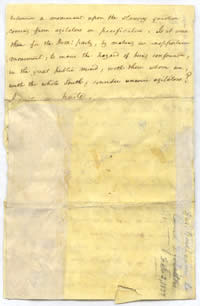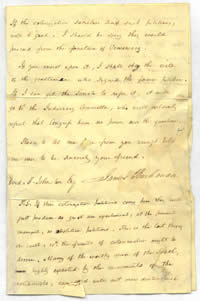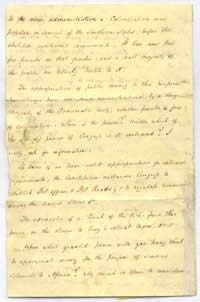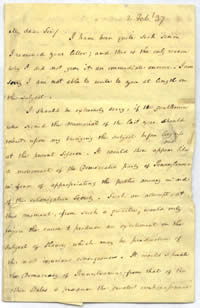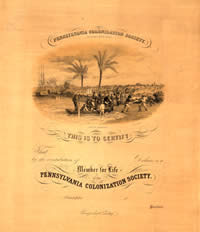The Colonization Movement - 1837
Images
Click images for larger versions.
History
Manuscript Group 28: James Buchanan Collection. Letter from James Buchanan to Ovid Johnston concerning a proposal made by petitioners of the American Colonization Society asking for public funding, February 2, 1837. Manuscript Group 8: Pennsylvania Collection. A blank membership form from the Pennsylvania Colonization Society.
Founded by clergyman Robert Finley in Washington, D.C. in 1816, the American Colonization Society sought to resettle freed Blacks in Africa. The idea of colonization resulted in odd and shifting alliances prior to the Civil War. A substantial base of support originally existed for the colonization scheme among white southerners until colonization became increasingly tied to the abolition of slavery. From the outset, however, many Black abolitionists resisted the idea of being forced to leave the only homeland they had ever known. From 1835 to 1865 the Pennsylvania Colonization Society published the monthly Colonization Herald and General Register in Philadelphia that vigorously promoted the colonization of freed Blacks in Liberia.
In this letter to Ovid F. Johnston dated 2 February 1837 concerning possible federal funding for colonization, Pennsylvania Senator James Buchanan wrote:
I should be extremely sorry, if the gentlemen who signed the memorial of the last year should insist upon my bringing the subject before Congress at the present session. It would then appear like a movement of the Democratic Party of Pennsylvania in favor of appropriating the public money in aid of the Colonization Society. Such an attempt, at this moment, from such a quarter, would only injure the cause and produce an excitement on the subject of slavery which (sic) may be productive of the most injurious consequences. It would separate the Democracy of Pennsylvania from that of the other states and produce the greatest embarrassment to the new administration [of President Martin van Buren]. Colonization was popular in several of the Southern States before the abolition excitement commenced. It has now but few friends in that quarter, and a vast majority of the people are bitterly opposed to it. The appropriation of money to this purpose has always been considered unconstitutional by a large majority of the Democratic party, whether friends or foes of colonization.
This advocacy of moderation was written against the larger background of Senator Buchanan's compromise proposal that had ended the "Gag Rule Controversy" on March 14, 1836 by a vote of 34-6. Where John C. Calhoun of South Carolina proposed rejecting all abolitionist petitions to end slavery in the District of Columbia, and Henry Clay of Kentucky advocated receiving and giving consideration to all such petitions, Buchanan's compromise solution was to receive and then immediately reject all such petitions. While the subtlety of the difference between Calhoun's position and Buchanan's position may easily escape us today, it was nonetheless perceived as a sufficiently critical difference at that time to garner a majority vote in the Senate while being rejected by such bitter enemies as Daniel Webster of Massachusetts on the one hand and John C. Calhoun of South Carolina on the other.
In 1856, Buchanan's skill in the art of compromise resulted in his becoming, by a narrow margin, the only Pennsylvanian so far elected President of the United States. When, after four frustrating years as president, Buchanan announced he would not run for reelection, the Democratic Party split into factions and Republican Abraham Lincoln was elected president in a four-way race in which he carried not a single southern state and less than 40% of the popular vote. Upon learning the results of the election, South Carolina immediately seceded from the Union and was quickly followed by seven other states. During the remaining three months of his term, President Buchanan refused to recognize the right of any state to secede from the Union but also vowed he would commit no act of aggression toward the seceded states. Though he refused to give in to demands by South Carolina to surrender Fort Sumter and Fort Pickens, reinforcements sent to Fort Sumter were turned back by rebel artillery. Informal agreements between Buchanan and South Carolina prevented the formal outbreak of war until after Lincoln had moved into the presidential mansion. The rebellion that was touched off by the failure of Buchanan's policy of conciliation reached its high water mark in Pennsylvania in 1863 during the Gettysburg campaign when rebel advance forces approached within a dozen miles of Buchanan's Lancaster County home.
Letters such as this one provide historians the opportunity to examine both the inner thoughts as well as the rationalizations that shaped the actions of their authors. They also can document how personal connections and changing spheres of influence continually reshape the currents of history. In some cases, the discovery of a single letter can completely transform scholars' conventional interpretations of a historical event. In others, as shown by the timely interception of the January 19, 1917 Zimmerman Telegram that led to America's entry into the First World War, they directly shape the course of contemporary historical events.
Transcript
2 Feb. '37
My dear Sir,
I have been quite sick since I received your letter; and this is the only reason why I did not give it an immediate answer. I am sorry I am not able to write to you at length on the subject.
I should be extremely sorry, if the gentlemen who signed the memorial of the last year should insist upon my bringing the subject before Congress at the present session. It would then appear like a movement of the Democratic Party of Pennsylvania in favor of appropriating the public money in aid of the Colonization Society. Such an attempt, at this moment, from such a quarter, would only injure the cause and produce an excitement on the subject of slavery which (sic) may be productive of the most injurious consequences. It would separate the Democracy of Pennsylvania from that of the other states and produce the greatest embarrassment to the new administration [of President Martin van Buren]. Colonization was popular in several of the Southern States before the abolition excitement commenced. It has now but few friends in that quarter, and a vast majority of the people are bitterly opposed to it. The appropriation of money to this purpose has always been considered unconstitutional by a large majority of the Democratic party, whether friends or foes of colonization.
If some of us have voted appropriations for internal improvements, the Constitution authorizes Congress to establish Post offices and Post Roads, and to regulate commerce among the several states etc.
The advocates of a Bank of the U.S. find this power in the clause to levy and collect taxes, etc. etc. Upon what granted power will you hang that to appropriate money for the purpose of sending Colonists to Africa? My mind is open to convincing. If the colonization Societies send such petitions, well and good. I should be sorry if they would proceed from the fountain of Democracy.
If you insist upon it, I shall obey the will of the gentlemen who signed the former petition. If I can get the Senate to refer it, it will go to the Judiciary Committee, who will certainly report that Congress have no power over the question.
Please to let me hear from you soon, and believe me ever to be sincerely your friend.
James Buchanan
Ovid F. Johnston, Esq.
P.S. If these colonization petitions come here they will just produce as great an excitement, at the present moment, as Abolition petitions. This is the last thing on earth, we the friends of colonization ought to desire. Many of the worthy men of the South, highly exited by the movements of the abolitionists, cannot and will not now distinguish between a movement upon the Slavery question coming from agitators or pacificators. Is it wise then for the Dem: party, by making an inopportune movement, to incur the hazard of being confounded in the great public mind, with those whom we, with the whole South, consider unwise agitators?
I write in haste.
Jas. Buchanan to Ovid F. Johnston, February 2, 1837
